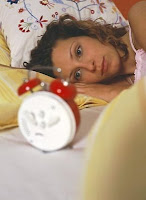The Insomnia sleep disorder is also known as Wakefulness or Dysomnia and is an inability to sleep, or to sleep for long enough to get a proper night's rest. When you have trouble falling or staying asleep, you have insomnia.
The majority of researchers recommend that grownups need to sleep between six and eight hours nightly. Most of us work best on eight hours that includes REM time. Up to 20 million people in the United States alone have serious difficulty sleeping nightly.
Insomnia actually takes its name from the Latin word, which literally means “no sleep” or the inability to sleep (“In” means no and “somnus” means sleep). Insomnia is a term used to describe several types of sleeplessness. With insomnia, you experience a significant lack of sleep on a regular or frequent basis.
Insomnia usually takes one or more of the following forms:
Difficulty falling asleep - more common among young people.
Difficulty maintaining sleep (sleeping lightly and restlessly, waking often, lying awake in the middle of the night) - more common in people over 40. In younger people it may be associated with depression.
Waking early and being unable to get back to sleep - this is more common in older people and anyone worrying about something in particular.
There are two broad insomnia categories:
Transient insomnia - lasting for a few nights or weeks only, usually connected to a stressful event.
Chronic insomnia - lasting for several weeks, months or even years.
Insomnia is also classified into primary and secondary insomnia.
Primary insomnia is insomnia that is not caused by health problems. This is the most common type of insomnia.
Secondary insomnia is a symptom of another underlying condition that causes the insomnia. When you receive effective treatment for the underlying condition, the insomnia usually goes away.
People tend to sleep more lightly and for shorter time spans as they get older, although they generally need about the same amount of sleep as they needed in early adulthood. About half of all people over 65 have frequent sleeping problems, such as insomnia, and deep sleep stages in many elderly people often become very short or stop completely.
Insomnia Statistics:
Psychological causes: 50%
Behavioural causes:
sleep environment 30%
stimulants or medication 10%
Physical causes: 10%
The end result is poor-quality sleep that doesn’t leave you feeling refreshed when you wake up. Insomnia can cause excessive daytime sleepiness and a lack of energy. Insomnia also can limit the energy you have to spend with friends or family. Long-term insomnia can cause you to feel depressed or irritable; have trouble paying attention, remembering and learning; and not do your best on the job or at school. Women and the elderly are the most common targets of this sleep disorder.
Recommended Reading:








